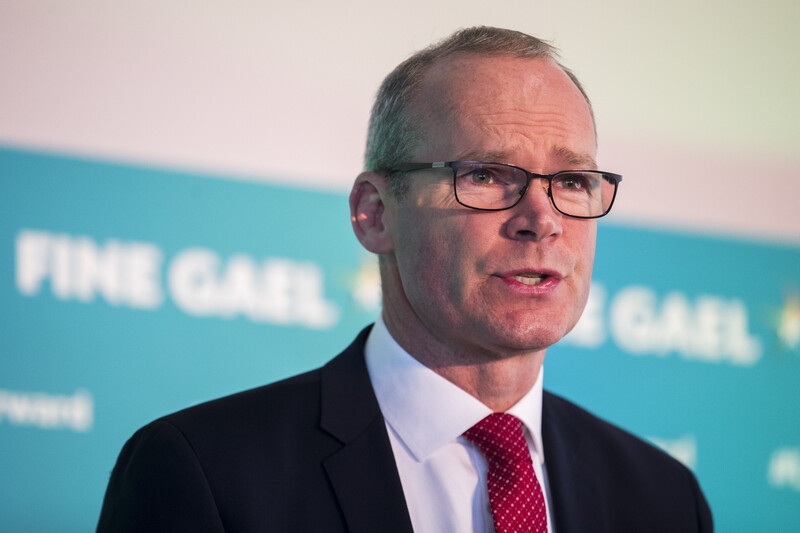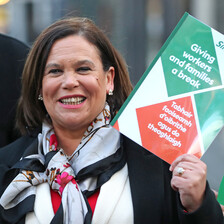The Electronic Intifada 29 May 2020

Simon Coveney, Ireland’s foreign minister, has cited EU policy in an attempt to excuse his own inaction on Israel’s war crimes.
PA Wire/ZUMA PressPolitical parties seeking to form a new government in Ireland are divided over a proposed ban on goods from Israel’s settlements in the occupied West Bank.
Talks aimed at piecing together a ruling coalition are at an advanced stage in Dublin with participants differing on how they should respond to Israel’s war crimes.
Two of the three parties involved in the negotiations – Fianna Fáil and the Greens – both support the Occupied Territories Bill, which would outlaw imports from illegal settlements. Both have advocated that the bill should be implemented as part of a legislative program for a ruling coalition.
Yet the third party in the talks, the right-wing Fine Gael, is opposed to the bill.
Simon Coveney, Ireland’s current foreign minister, heads the Fine Gael negotiating team. He recently claimed that the Occupied Territories Bill asks the Irish government to “do something which is not legally in its power.”
Obligation
Coveney has argued that trade policy is a matter of responsibility for the European Union collectively and that Ireland cannot take unilateral action against settlement goods.
That argument has been contested by a number of scholars, including Michael Lynk, a Canadian law professor and the UN special rapporteur on the West Bank and Gaza. These experts point out that Israel’s settlement activities in the West Bank and Golan Heights violate international law and that countries around the world are obligated to avoid assisting such violations.
The construction and expansion of Israel’s settlements in territory occupied since 1967 constitute war crimes under the Fourth Geneva Convention.
Tom Moerenhout, an international affairs professor at New York’s Columbia University, told an online conference last week that other countries have a duty not to recognize the illegal situation created by Israel’s settlement activities.
“There is an obligation under international law to not trade with settlements,” he said. “And why is that? Because that trade should never have existed in the first place.”
“One big question is can [EU] member states really act on their own?” asked Moerenhout. “The answer is ‘yes.’”
Governments in the EU have the “explicit right,” Morenhout added, to “take any restrictive measures that they see as needed for public policy.”
The Occupied Territories Bill has already been approved by a majority in both houses of the Oireachtas, Ireland’s parliament. All parties, with the exception of Fine Gael, have voted in favor of it.Commitments were also made to implement the bill in some of the manifestos on which Ireland’s parties fought a general election in February. Sinn Féin won the largest share of the vote in that election yet not enough seats to form a parliamentary majority.
Fianna Fáil and Fine Gael – the two dominant players in Irish politics for most of the last 100 years – have both resolved not to enter government with the left-leaning Sinn Féin. Although the process of patching together a coalition has been delayed by the COVID-19 pandemic, it is thought likely that a program for a new government will soon be agreed between Fianna Fáil, Fine Gael and the Greens.
Urgent
Advocates of a settlement goods ban believe the issue has become increasingly urgent now that the new Israeli government has resolved to annex a large part of the West Bank, possibly within a matter of weeks.
“The EU is actively discussing ways it can respond to Israel’s annexation proposals,” said Marie Crawley from Sadaka, an Irish group defending Palestinian rights. “Ireland has one pre-prepared solution in the form of the Occupied Territories Bill. It is a finely tuned instrument, grounded in international law and deemed by leading legal experts to be fully compatible with EU trade law.”
“Now is not the time to cast aside the aspirations of the Palestinian people,” said Fatin al-Tamimi, chair of the Ireland Palestine Solidarity Campaign. “Indeed with Israel moving to illegally annex the West Bank in a little over a month, such robust legislation is needed now more than ever to defend international law – not just in Ireland but in every state that claims to support human rights and the rule of law.”
Clare Daly, an Irish member of the European Parliament, noted there has been “enormous interest” in the Occupied Territories Bill internationally. By introducing a ban on settlement goods, Ireland would be “showing that a small country can bring about positive change,” she added.
“The argument which won the discussion in Ireland was very simple,” Daly said. “How can we condemn the settlements as illegal and then happily buy the proceeds of that crime? It just doesn’t make sense. It’s an affront to human rights. We are culpable in families being kicked out of their homes, in farming land being taken, if we continue to buy these products.”
Ciaran Tierney is an award winning blogger and a former newspaper journalist. Twitter: @ciarantierney. Website: ciarantierney.com.





